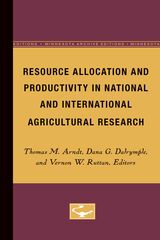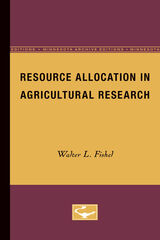4 books about Resource Allocation

Planning without Facts
Lessons in Resource Allocation from Nigeria’s Development, With an Input–Output Analysis of the Nigerian Economy, 1959–60
Wolfgang F. Stolper
Harvard University Press

Resource Allocation and Productivity in National and International Agricultural Research
Thomas Arndt
University of Minnesota Press, 1977
Resource Allocation and Productivity in National and International Agricultural Research was first published in 1977.Agricultural research in developing countries has grown rapidly in recent years. As the research system has expanded, questions about the productivity of research and the allocation of research resources have become important issues for development planners, science managers, donor agencies, and other individuals and institutions concerned with research operations and opportunities.In this volume, forty contributors - natural and social scientists and research administrators - provide a comprehensive analysis of the implications of agricultural science and technology for agricultural development. They examine recent evidence on the returns to investment in national and international agricultural research systems and explore the relevance of social and economic factors for the organization and management of these systems. In a final section they discuss research strategy and management issues that will affect the future productivity and organization of both the international and the national research systems.The material is based on papers given at a conference held at Airlie House, Virginia, sponsored by the Agricultural Development Council. Funding was provided through the U.S. Agency for International Development (USAID), support of the Council’s Research Training and Network Program, and by additional assistance from the World Bank.
[more]

Resource Allocation in Agricultural Research
Walter Fishel
University of Minnesota Press, 1971
Resource Allocation in Agricultural Research was first published in 1971.The new knowledge produced by research has accounted for an increasing share of national economic growth in this country. As the economic importance of research has risen, the emerging problems attendant on the allocation of resources to research has attracted increased professional attention.This book presents the views and findings of a number of experts concerned with the problems, issues, and procedures involved in the allocation of resources for agricultural research. The twenty-one contributors include agricultural and general economists, public administration officials, scientists, and other specialists. The chapters are based on papers given at a symposium which was sponsored jointly by the Minnesota Agricultural Experiment Station and the Cooperative States Research Service of the U.S. Department of Agriculture.In his preface Walter L. Fishel, the volume editor, explains: “While the symposium participants presented varying points of view and different approaches to the problems on resource allocation in agricultural research, they generally shared the orientation of economic theory. Both the issues examined and the debate reflect this perspective. The general assumption was that the allocation problem to a considerable extent can be approached within an economic framework. More specifically, it was generally agreed that research may be viewed as an economic activity since it requires scarce resources and produces something of value.”After an introductory chapter which explains the problems and issues, the rest of the volume is divided into sections on research and welfare, investments in research, decision making in practice, and decision making experiments.
[more]

Resource Allocation in Higher Education
William F. Massy, Editor
University of Michigan Press, 1996
Resource Allocation in Higher Education describes how colleges, universities, and government agencies can use budgeting processes to improve program planning and productivity. Drawn from the contributors' direct experiences as well as research findings, it blends conceptual foundations with practical insights. Many resource allocation processes in higher education need reform, and this volume will stimulate and assist that effort.
Beginning with the economic theory of nonprofits, the essays examine current budgeting systems in both theoretical and practical terms. Resource allocation systems from other domains such as health care are explored for relevant insights. Throughout, decentralization remains a major theme. Topics range from the eminently practical--how to establish a global accounting system or choose an endowment spending rate--to the more abstract--the theory of how various nonprofit enterprises balance academic values against market pressures. The volume ends by proposing value responsibility budgeting, which offers institutions a potentially better way of pursuing their academic values while remaining responsive to market pressures.
Those within higher education institutions who are responsible for resource allocation, such as provosts, chief financial officers, or budget directors, will find much that speaks to them. While mostly in the domain of higher education economics, management, and planning, the essays are written for any serious reader concerned with the problem of reform in higher education.
William F. Massy is Professor of Education and Business Administration at Stanford University.
Beginning with the economic theory of nonprofits, the essays examine current budgeting systems in both theoretical and practical terms. Resource allocation systems from other domains such as health care are explored for relevant insights. Throughout, decentralization remains a major theme. Topics range from the eminently practical--how to establish a global accounting system or choose an endowment spending rate--to the more abstract--the theory of how various nonprofit enterprises balance academic values against market pressures. The volume ends by proposing value responsibility budgeting, which offers institutions a potentially better way of pursuing their academic values while remaining responsive to market pressures.
Those within higher education institutions who are responsible for resource allocation, such as provosts, chief financial officers, or budget directors, will find much that speaks to them. While mostly in the domain of higher education economics, management, and planning, the essays are written for any serious reader concerned with the problem of reform in higher education.
William F. Massy is Professor of Education and Business Administration at Stanford University.
[more]
READERS
Browse our collection.
PUBLISHERS
See BiblioVault's publisher services.
STUDENT SERVICES
Files for college accessibility offices.
UChicago Accessibility Resources
home | accessibility | search | about | contact us
BiblioVault ® 2001 - 2025
The University of Chicago Press









